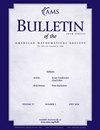拟线性问题的局部适定性:一个引子
IF 1.6
3区 数学
Q1 MATHEMATICS
引用次数: 6
摘要
证明偏微分方程中拟线性问题的局部适定性存在许多困难,其中一些是普遍的,另一些是更具体的问题。一方面,关于装腔作势应该意味着什么的共同标准已经存在了很长一段时间,可以追溯到哈达玛。另一方面,在实现这一目标方面,现在既有许多变化,也有许多误解。这些解释性笔记的目的是收集这个方向上的一些经典和最新的想法,并将它们组合成一个有凝聚力的路线图,然后根据读者的选择问题进行调整。本文章由计算机程序翻译,如有差异,请以英文原文为准。
Local well-posedness for quasi-linear problems: A primer
Proving local well-posedness for quasi-linear problems in partial differential equations presents a number of difficulties, some of which are universal and others of which are more problem specific. On one hand, a common standard for what well-posedness should mean has existed for a long time, going back to Hadamard. On the other hand, in terms of getting there, there are by now both many variations—and also many misconceptions.
The aim of these expository notes is to collect a number of both classical and more recent ideas in this direction, and to assemble them into a cohesive roadmap that can be then adapted to the reader’s problem of choice.
求助全文
通过发布文献求助,成功后即可免费获取论文全文。
去求助
来源期刊
CiteScore
2.90
自引率
0.00%
发文量
27
审稿时长
>12 weeks
期刊介绍:
The Bulletin publishes expository articles on contemporary mathematical research, written in a way that gives insight to mathematicians who may not be experts in the particular topic. The Bulletin also publishes reviews of selected books in mathematics and short articles in the Mathematical Perspectives section, both by invitation only.

 求助内容:
求助内容: 应助结果提醒方式:
应助结果提醒方式:


